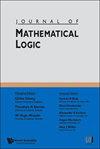带有过滤器的游戏1
IF 0.9
1区 数学
Q1 LOGIC
引用次数: 0
摘要
本文分为两部分。第一个是Holy和Schlicht引入的游戏系列的变体,我们称之为Welch游戏。在Welch博弈中,玩家II的获胜策略长度为[公式:参见文本],相当于弱紧凑性。赢得游戏长度[公式:见文本]等同于[公式:见文本]是可测量的。我们表明,对于中等长度的游戏,获胜意味着存在险峻的理想,即[公式:见文本]-封闭,[公式:见文本]-密集树。第二部分表明第一部分不是空洞的。对于[公式:见文本]和[公式:见文本]之间的每个[公式:见文本],它给出了一个模型,其中II赢得了长度游戏[公式:见文本],但不是[公式:见文本]。该技术还提供了模型,其中对于所有[公式:见文]存在[公式:见文]-完全,正常,[公式:见文]-分布理想具有密集集,[公式:见文]-封闭,但不是[公式:见文]-封闭。本文章由计算机程序翻译,如有差异,请以英文原文为准。
Games with filters I
This paper has two parts. The first is concerned with a variant of a family of games introduced by Holy and Schlicht, that we call Welch games. Player II having a winning strategy in the Welch game of length [Formula: see text] on [Formula: see text] is equivalent to weak compactness. Winning the game of length [Formula: see text] is equivalent to [Formula: see text] being measurable. We show that for games of intermediate length [Formula: see text], II winning implies the existence of precipitous ideals with [Formula: see text]-closed, [Formula: see text]-dense trees. The second part shows the first is not vacuous. For each [Formula: see text] between [Formula: see text] and [Formula: see text], it gives a model where II wins the games of length [Formula: see text], but not [Formula: see text]. The technique also gives models where for all [Formula: see text] there are [Formula: see text]-complete, normal, [Formula: see text]-distributive ideals having dense sets that are [Formula: see text]-closed, but not [Formula: see text]-closed.
求助全文
通过发布文献求助,成功后即可免费获取论文全文。
去求助
来源期刊

Journal of Mathematical Logic
MATHEMATICS-LOGIC
CiteScore
1.60
自引率
11.10%
发文量
23
审稿时长
>12 weeks
期刊介绍:
The Journal of Mathematical Logic (JML) provides an important forum for the communication of original contributions in all areas of mathematical logic and its applications. It aims at publishing papers at the highest level of mathematical creativity and sophistication. JML intends to represent the most important and innovative developments in the subject.
 求助内容:
求助内容: 应助结果提醒方式:
应助结果提醒方式:


